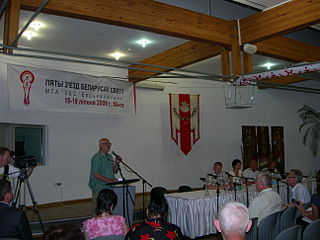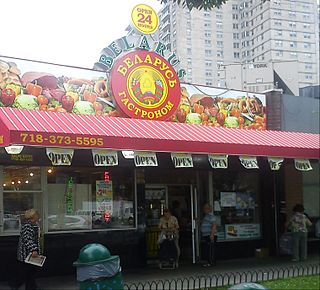
The German diaspora consists of German people and their descendants who live outside of Germany. The term is used in particular to refer to the aspects of migration of German speakers from Central Europe to different countries around the world. This definition describes the "German" term as a sociolinguistic group as opposed to the national one since the emigrant groups came from different regions with diverse cultural practices and different varieties of German. For instance, the Alsatians and Hessians were often simply called "Germans" once they set foot in their new homelands.

The history of the Jews in the Soviet Union is inextricably linked to much earlier expansionist policies of the Russian Empire conquering and ruling the eastern half of the European continent already before the Bolshevik Revolution of 1917. "For two centuries – wrote Zvi Gitelman – millions of Jews had lived under one entity, the Russian Empire and [its successor state] the USSR. They had now come under the jurisdiction of fifteen states, some of which had never existed and others that had passed out of existence in 1939." Before the revolutions of 1989 which resulted in the end of communist rule in Central and Eastern Europe, a number of these now sovereign countries constituted the component republics of the Soviet Union.

The Polish diaspora comprises Poles and people of Polish heritage or origin who live outside Poland. The Polish diaspora is also known in modern Polish as Polonia, the name for Poland in Latin and many Romance languages.
This article details the geographical distribution of speakers of the German language, regardless of the legislative status within the countries where it is spoken. In addition to the Germanosphere in Europe, German-speaking minorities are present in many other countries and on all six inhabited continents.

Russian Americans are Americans of full or partial Russian ancestry. The term can apply to recent Russian immigrants to the United States, as well as to those who settled in the 19th-century Russian possessions in northwestern America. Russian Americans comprise the largest Eastern European and East Slavic population in the US, the second-largest Slavic population generally, the nineteenth-largest ancestry group overall, and the eleventh-largest from Europe.

Polish Brazilians refers to Brazilians of full or partial Polish ancestry who are aware of such ancestry and remain connected, to some degree, to Polish culture, or Polish-born people permanently residing in Brazil. Also, a Polish Brazilian may have one Polish parent.
Russian Australians comprise Australian citizens who have full or partial Russian heritage or people who emigrated from Russia and reside in Australia.

The Russian diaspora is the global community of ethnic Russians. The Russian-speaking (Russophone) diaspora are the people for whom Russian language is the native language, regardless of whether they are ethnic Russians or not.

Belarusian Americans, also known as White Russian Americans and White Ruthenian Americans, are Americans who are of total or partial Belarusian ancestry.

Ukrainian Australians refers to Australian citizens of Ukrainian descent, or Ukraine-born people who emigrated to Australia. They are an ethnic minority in Australia, numbering about 38,000 people according to the 2011 Census. Currently, the main concentrations of Ukrainians are located in the cities of Sydney and Melbourne.
Swedish Australians are Australians with Swedish ancestry, most often related to the large groups of immigrants from Sweden in the late nineteenth century and early twentieth century. The 2011 Census showed 34,029 people who claimed Swedish ancestry, having an increase compared to those 30,375 in 2006. Most Swedish Australians are Lutherans affiliated with the Evangelical Lutheran Church. They form the largest Scandinavian minority in Australia.

European emigration is the successive emigration waves from the European continent to other continents. The origins of the various European diasporas can be traced to the people who left the European nation states or stateless ethnic communities on the European continent.
The Albanian diaspora are the ethnic Albanians and their descendants living outside of Albania, Kosovo, southeastern Montenegro, western North Macedonia, southeastern Serbia, northwestern Greece and Southern Italy.
Russian Argentines are people from Russia living in Argentina, and their Argentine-born descendants. The estimates of the number of Argentines of Russian descent vary between 170,000 and 350,000. They are mostly living in Buenos Aires and Greater Buenos Aires.

The Belarusian diaspora refers to emigrants from the territory of Belarus as well as to their descendants.

Belarusians in the United Kingdom are Belarusians living in the United Kingdom and British people of Belarusian background or descent. The 2001 UK census recorded 1,154 Belarus-born people living in the UK. The 2011 census recorded 4,031 Belarus-born people resident in England, 102 in Wales, 211 in Scotland and 62 in Northern Ireland. Nowadays, organised community life exists only in London.
Romanian Argentines are Argentine citizens of Romanian descent or a group of Romania-born people who nowadays reside in Argentina.

Emigration from Malta or the Maltese diaspora consists of Maltese people and their lineal descendants who emigrated from Malta. It was an important demographic phenomenon throughout the nineteenth and twentieth centuries, leading to the creation of large diaspora’s concentrated in English-speaking countries such as Australia, Canada, United Kingdom and the United States.

New York City includes a sizeable Belarusian American population. The New York metropolitan area has one of the largest concentrations of Belarusians in the United States. Many Belarusians live in Brighton Beach and elsewhere in South Brooklyn, along with other ex-Soviet immigrants including Russians and Ukrainians. Around 55,000 people of Belarusian descent live in the New York City metropolitan area, with estimates ranging from 50,000 to 75,000.












